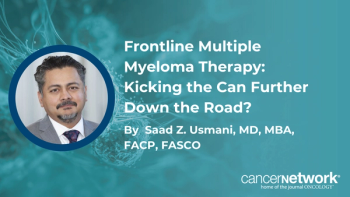
Adjuvant/Neoadjuvant Chemotherapy Is Not Associated With Complications or Patient-Reported Outcomes Among Breast Cancer Survivors
Patients undergoing implant-based or autologous reconstruction and received adjuvant or neoadjuvant chemotherapy did not have an association with likelihood of complications compared with those who did not undergo chemotherapy.
Neither the use of adjuvant or neoadjuvant chemotherapy in patients who underwent implant-based or autologous reconstruction was associated with the likelihood of complications, althoguh chemotherapy was not associated with patient satisfaction with reconstruction or psychosocial wellbeing among survivors of breast cancer, according to an article in JAMA Surgery.
Among patients who underwent reconstruction, significantly different rates of complication were noted, with higher complication rates reported for those treated with adjuvant chemotherapy (31.2%; n = 153/490) and neoadjuvant therapy 28.8% (n = 44/153) vs those who did not receive chemotherapy (24.1%; n = 176/730; P = .02).
Within the study, 73.0% (n = 1373) of patients underwent implant-based procedures, and 27.0% (n = 508) had autologous reconstruction. A total of 10.6% (n = 200) of patients received treatment with neoadjuvant chemotherapy, 35.5% (n = 668) were treated with adjuvant chemotherapy, and 53.9% (n = 1013) of patients were not given chemotherapy.
Patients who received chemotherapy and underwent bilateral reconstruction were more commonly treated with neoadjuvant chemotherapy (63.5%; n = 127/200) compared with 53.6% (n = 358/668) for adjuvant chemotherapy and 52.7% (n = 534/1013) received no chemotherapy (P = .02). Among those who underwent a mastectomy and did not receive chemotherapy, patients were more likely to undergo nipple-sparing surgery (13.2%; n = 134/1013) compared with those who received neoadjuvant chemotherapy (10.5%; n = 21) and adjuvant chemotherapy (9.1%; n = 61; P = .03). Finally, among women who had lymph node involvement, those who received no chemotherapy were more likely to have a sentinel node biopsy (67.7%; n = 686) compared with those who received neoadjuvant chemotherapy (35.0%; n = 70) and were treated with adjuvant chemotherapy (43.7%; n = 292; P< .001).
Investigators noted higher rates of complications in 24.7% (n = 121) of patients who were treated with adjuvant chemotherapy and 22.2% (n = 34) of those who received neoadjuvant chemotherapy compared with 16.2% (n = 118) of patients who were not treated with chemotherapy (P< .001).
The highest rates of reconstructive failure were observed in 10.8% (n = 53) of patients who underwent treatment with adjuvant chemotherapy compared with 6.5% (n = 10) of those receiving neoadjuvant chemotherapy and 4.5% (n = 33) of those who received no chemotherapy (P< .001). Additionally, among patients who underwent autologous reconstruction, those treated with adjuvant chemotherapy had the highest rates of any (56.7%; n = 101) and major (34.3%; n = 61) complications, as well as reconstruction failures (2.2%; n = 4).
Additionally, patients who received neoadjuvant chemotherapy had the lowest rates of any complications (46.8%; n = 22) and major complications (21.3%; n = 10); no patients in this cohort experienced reconstructive surgery failure.
Two years after surgery, patients in the implant and autologous procedure groups who did not receiving chemotherapy had the highest overall mean scores across all subscales, including satisfaction with the breast (65.1 and 69.3, respectively), as well as psychosocial (76.2 and 78.0, respectively), physical (77.9 and 78.2), and sexual (55.7 and 59.8).
Reference
Hart SE, Brown DL, Kim HM, Qi J, Hamill JB, Wilkins EG. Association of clinical complications of chemotherapy and patient-reported outcomes after immediate breast reconstruction. JAMA Surg. 2021;156(9):847-855. doi:10.1001/jamasurg.2021.2239
Newsletter
Stay up to date on recent advances in the multidisciplinary approach to cancer.






































